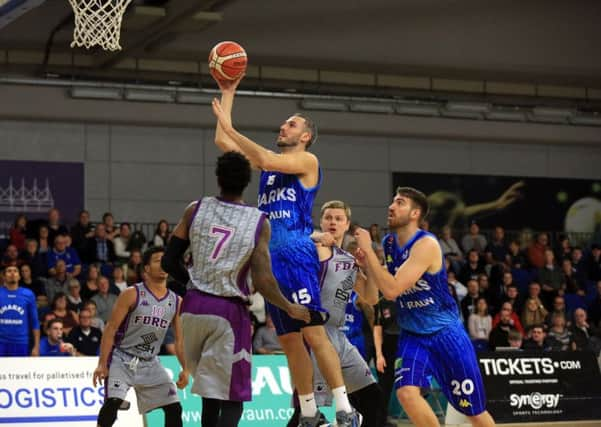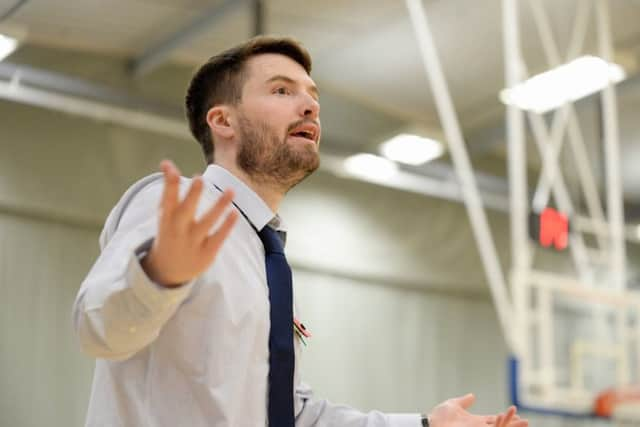Nick Westby: Basketball's ongoing battle to stand tall


One teenager, a young Asian man, bounces the ball quickly before throwing it to a black girl, who dribbles past another black youngster and drives to the basket.
She is stopped in her tracks by a stocky white adolescent who speaks with an eastern European accent. Turning around, he throws the ball to another white face, whose accent is distinctly more local.
“Giz it ‘ere,” comes the cry from the young Yorkshireman.


Advertisement
Hide AdAdvertisement
Hide AdIt is a scene replicated up and down the country’s inner-cities, with the picture in Leeds no different to that found in Birmingham or London, Sheffield or Manchester – save for the Yorkshire accent.
Basketball is an increasingly popular sport among young people from across the ethnic spectrum in this country.
There are various studies into participation levels in sport, all with differing models and measurements, the majority of which reach the conclusion that for a sport traditionally seen as American and battling against longheld national past-times like football and cricket, basketball more than holds its own.
Perhaps the most telling study comes from the Department for Culture, Media and Sport, which says that 32 per cent of children aged between 11 and 15 play basketball and that 30 per cent of those are women and 50 per cent and from ethnic minorities.


Advertisement
Hide AdAdvertisement
Hide AdBasketball England’s own survey suggests one in four teenagers play at least once a month, while more than 306,000 people aged over 16 play it twice a month.
And yet beyond that teenage groundswell, basketball is a sport that is struggling to survive in this country.
That plight had a spotlight shone on it this week in a parliamentrary debate, sparked by the growing funding crisis at the very top of the game.
British Basketball needs £1m a year to enable its teams to fulfil their international fixtures but only has £100,000 guaranteed after March, throwing the future of its eight men’s, women’s and age-group teams in international competition into jeopardy.
Advertisement
Hide AdAdvertisement
Hide AdGrassroots funding agency Sport England does fund the sport at the bottom of the pyramid but its temporary support for the international age-group teams is about to run out.
Basketball has not received backing as an Olympic sport since the country’s staging of the London 2012 Games earned them a host’s wildcard.
UK Sport prioritise winning medals over participation when it comes to their funding programme, which is why an exclusive sport like skeleton will get money for the next four years after three medals were won in PyeongChang, while inclusive team sports like basketball suffer on the back of their senior teams struggling to win either of the two gold medals on offer.
There is money going in from Sport England – £4,730,000 over four years to Basketball England to drive participation. With that money, the grass roots governing body is targeting high levels of ethnic minorities and low socio-demographic participation, something abundantly clear from our inner-cities.
Advertisement
Hide AdAdvertisement
Hide AdThe body facilitates a thriving Academy Basketball structure in partnership with the Further Education sector for both men and women aged 16 to 19, which is responsible for developing a large percentage of players on their talent pathway.
But the competition to identify and retain this large percentage of young people playing basketball is fierce, and one not helped by the funding gap for the major national teams and by a senior league that has forever struggled to find a place in the mainstream.
The British Basketball League has been in operation for 31 years, but its 12 teams still play to an average league attendance of 2,300, a number only reached when every arena is full.
There is little or no broadcast deal in place, sparse revenue streams and serious competition from abroad for not only senior players, but also those teenagers who play the game so frequently.
Advertisement
Hide AdAdvertisement
Hide Ad“Most kids if they’re pretty good will target getting to the US college system,” says Jeff Taylor, a well-travelled American commentator, who cites West Yorkshire among his many stops following the sport he loves.
“In the late 1990s when I was in Leeds, Sky were broadcasting the BBL games and doing a great job but against the likes of football you’re fighting a losing battle.
“Clubs need their own arenas. They don’t have to be massive, they just have to be cosy.
“That is the biggest step and would be a much-needed development.”
Advertisement
Hide AdAdvertisement
Hide AdLeicester Riders, the current BBL champions, are the first to have opened their own arena and are slowly starting to see the benefits, beyond their own domestic success.
“Once we have an infrastructure and can start bringing money into the club on a game night, we can start to put more attention into the grass roots,” explains Riders chairman Kevin Routledge, who has previously served on the board of the BBL.
“Newcastle are building an arena and Sheffield Sharks have received planning permission on their own (the Park Community Arena on the Olympic Legacy Park in Attercliffe).
“It has been frustrating, but we are making progress.”
Routledge believes basketball is held back in this country because of culture. Children are taught football, cricket and rugby before they know anything else and each of those sports has self-sufficient grassroots structures that feed into hugely successful national leagues.
Advertisement
Hide AdAdvertisement
Hide Ad“Basketball is perceived as an American sport, when actually it’s global,” says Routledge. “There are players on massive salaries and big clubs in Eastern European countries, Greece, Spain, Israel and China.
“There is a degree of battling a culture against it, but we will get there. Basketball is not played in public schools. Talented kids go into football first, then rugby etc. We lose kids overseas where the money is better. Kids aspire to go to the United States.
“College basketball is a multi-billion dollar industry with massive television exposure. You can get an education for four years and they don’t have to pay these kids. The US College recruiting system is now going worldwide, through Europe and into Africa. That’s what we’re competing against.”
A lucrative TV deal would help, but the BBL has to get cute, sacrificing huge sums from broadcast rights by offering games to the BBC Sport website, FreeSports and other streaming services to get their product on as many platforms as possible.
Advertisement
Hide AdAdvertisement
Hide AdBasketball faces enormous challenges for acceptance in this country – from funding cuts to half-empty arenas, overseas talent scouts to traditional team sports – but if the scenes replicated in our inner-cities are anything to go by, there remains a huge appetite for it among this country’s youth and a perseverance among a core of passionate promoters to keep the debate going.